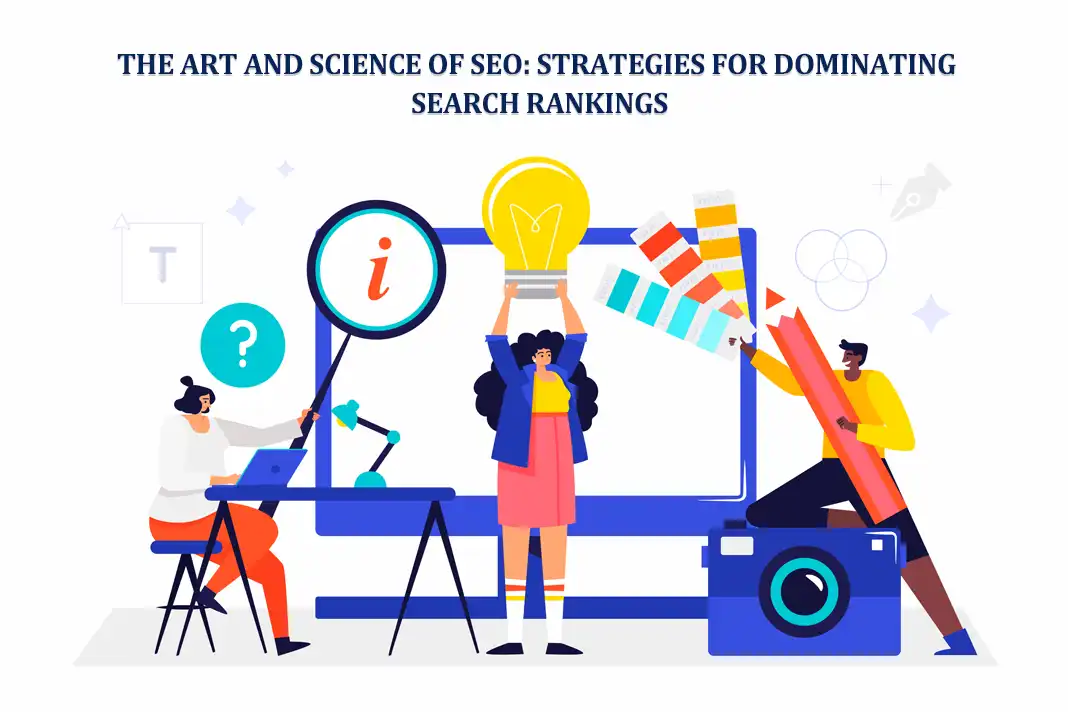The Art and Science of SEO: Strategies for Dominating Search Rankings
The Art of Search Engine Optimization
SEO is often considered an art that requires creativity, intuition, and strategic thinking for improved effectiveness. Successful SEO calls for knowledge on meeting users' and search engine needs.
Keyword Research
Keywords are the foundation of any SEO strategy. For example, research should be conducted on appropriate keywords and phrases related to your business, products, or target market segments. You can discover vital insights using tools like Host Much SEO Tool.
Content Optimization
Informative, high-quality content must be created for users and search engines. To improve readability and appeal for searches, optimize content with keywords focusing on targeted readership groups through effective headlines plus formatting structure that works best for them in addition to well-structured headings, making it easier for readers to find what they are looking for.
User Experience (UX) Optimization
Knowing that user experience is a significant ranking factor for search engines is essential. Your website should work well on mobile devices, be easily understood, and allow the same browsing across various devices. Page speed optimization, intuitive navigation, and clear calls-to-action can significantly affect user satisfaction and retention. You can also use the WooCommerce Private Store plugin to further improve your website and user experience.
Link Building
To achieve success in SEO, you must build a strong backlink profile. Concentrate on obtaining good backlinks from authoritative sites within your specific niche. Valuable backlinks that enhance your website's authority and credibility can be generated through guest blogging, influencer outreach, and content promotion strategies.
Mastering the Science of SEO
While the artistic elements of SEO lay the foundation, the scientific aspects enable precision, measurement, and refinement. SEO science is mastered using data, analytics, and technical expertise. Consider these strategies:
Technical SEO Audit
A comprehensive audit of the technical elements of your site, such as site structure, URL structure, meta tags, and schema markup- ensuring that you conduct a detailed analysis of issues or variations that may restrict crawlability indexability or user experiences to achieve goal attainment.
On-Page Optimization
Optimize single pages of your website for specific keywords, optimizing meta titles and description headings. Thus, ensure the content is well organized, relevant, and in line with what users search for. Implement schema markup to enhance rich snippets and improve visibility in SERPs.
Off-Page Optimization
Off-page SEO means all activities that need to be done on your website to build its authority and relevance. Build relationships with key influencers, get brand mentions, and acquire natural backlinks from quality sources. Monitor your brand mentions and citations for online reputation management.
Analytics and Measurement
Use tools such as Google Analytics, Google Search Console, or third-party analytics platforms to monitor and analyze metrics like traffic, engagement, conversion rates, and ranking positions. Observe the performance trends over time to make changes to the SEO strategy.
The Art of User-Centric SEO
While the scientific elements of SEO are fundamental, true success in dominating this area requires an artistic approach that favors user experience (UX). Here is where art plays a part in SEO.
- Content is King (and Queen): Informative, engaging, well-written content forms the backbone of any successful SEO campaign. Content must be optimized around relevant keywords and the needs and interests of your ideal customers. Thorough keyword research will help you understand what exactly users are looking for so that you can tailor your content toward solving their specific problems.
- Storytelling power: Although numbers and facts are essential, they can only captivate your audience when used in a compelling story. Utilize storytelling strategies to get information across in educational and engaging ways.
- Putting Readability First: In writing websites, complex sentence constructions and technical languages may impress search engine algorithms, but they may need to be more appealing to human beings. Therefore, it is advisable to come up with concise, clear, and well-organized sentences.
- Eye-catching Site Design: Humans don't just love text; they also like images. Therefore, inserting high-quality photos, videos, or infographics within your content will improve user engagement and break long stretches of text.
- Mobile Optimization: As mobile browsing continues its supremacy over desktop browsing, the need for a mobile-friendly website cannot be overlooked anymore; otherwise, it's a must-have. Ensuring that your website renders and responds perfectly across all devices is critical.
The Art and Science: A Synergistic Dance
The real magic of SEO occurs when you blend a scientific understanding of search engine algorithms with creative, user-focused content creation.
- Keyword Research with User Intent: Think beyond high-volume keywords. Use keyword research tools to find low-competition long-tail searches that reflect your target audience's specific search queries. This allows you to create targeted content that directly addresses user intent.
- User Experience-Based Technical SEO: The user experience of a website will be improved by technical SEO, such as high-performance pages and mobile-friendly designs. The bounce rate can be as high as the failure in the navigation of a slow website.
- Captivating Content that Attracts Backlinks: Insightful, informative, and engaging content attracts links naturally. Your work is more likely to be linked by other websites when you create top-notch content that solves users' problems or provides a fresh perspective, thereby increasing your SEOPower score.
The Path to SEO Dominance
It is not enough to become the number one on the search engine results page; it's all about maintaining this position for a long. One should always learn new things, improve, and adapt to stay competitive. We are going to give you directions on how to become an SEO master:
- Stay Informed: To gain knowledge about what is happening in the field of SEO, including industry trends, algorithm updates, webinars, reputable blogs on search engine optimization, and participating in active forums are a must for every person interested in this area.
- Experiment with SEO: SEO isn't a "one size fits all" approach. Examine different strategies, techniques, and mechanisms for finding the best practices peculiar to your business, making it unique and targeting market audiences. Continually monitor results and reflect upon them to improve SEO.
- Develop Sustainable Practices: Avoid taking shortcuts or using black hat tactics that may give you short-term advantages but ultimately risk your long-term achievement. Concentrate on creating sustainable SEO approaches that echo user experience, quality content, and ethical optimization.
- Ask Experts for Advice: If you feel overwhelmed by the intricacies of SEO, feel free to turn to seasoned professionals or agencies for help. Sharing your experiences with experienced SEO consultants can offer valuable insights, direction, and encouragement as you strive toward search engine supremacy.
Conclusion
To sum up, businesses pursuing dominance in search rankings and prevalence in cyberspace must master the art and science of SEO. By implementing creative strategies with analytical precision, staying informed, and practicing what is considered best practice, one can maximize the potentiality of Search Engine Optimization (SEO) while significantly boosting their venture's success levels through online channels.


